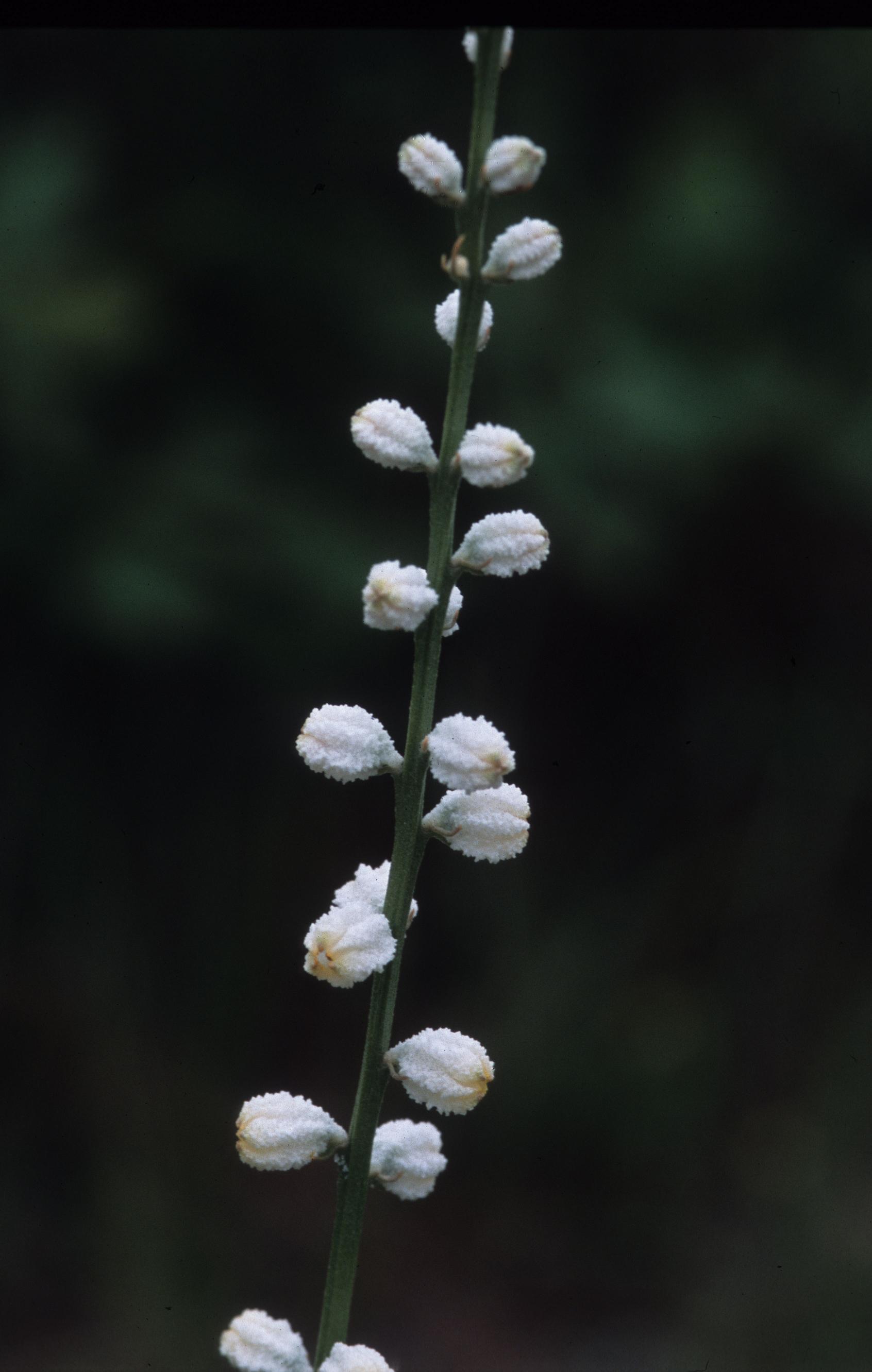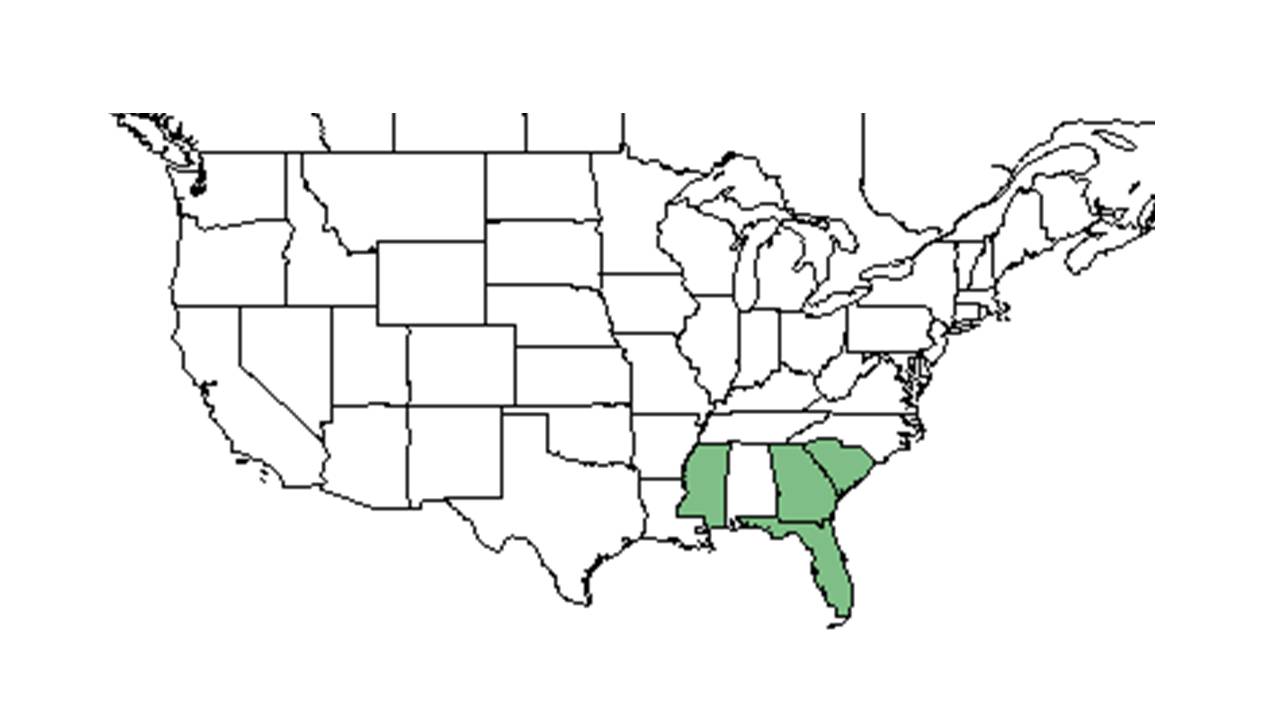Difference between revisions of "Aletris obovata"
(→Distribution) |
|||
| Line 28: | Line 28: | ||
==Ecology== | ==Ecology== | ||
===Habitat=== <!--Natural communities, human disturbed habitats, topography, hydrology, soils, light, fire regime requirements for removal of competition, etc.--> | ===Habitat=== <!--Natural communities, human disturbed habitats, topography, hydrology, soils, light, fire regime requirements for removal of competition, etc.--> | ||
| − | + | ||
| + | This species grows in longleaf pine/wiregrass flatwoods, moist slash pine/palmetto scrub, sandy peat of grass-sedge bogs, open seepage slopes, and wet flats (FSU Herbarium). It grows in dry loamy or moist sands in high light and has been seen growing along roadsides, ditches, and longleaf pine clearings (FSU Herbarium). | ||
===Phenology=== <!--Timing off flowering, fruiting, seed dispersal, and environmental triggers. Cite PanFlora website if appropriate: http://www.gilnelson.com/PanFlora/ --> | ===Phenology=== <!--Timing off flowering, fruiting, seed dispersal, and environmental triggers. Cite PanFlora website if appropriate: http://www.gilnelson.com/PanFlora/ --> | ||
Revision as of 13:16, 9 July 2015
| Aletris obovata | |
|---|---|

| |
| Photo was taken by Gil Nelson | |
| Scientific classification | |
| Kingdom: | Plantae |
| Division: | Magnoliophyta - Flowering plants |
| Class: | Liliopsida – Monocotyledons |
| Order: | Liliales |
| Family: | Liliaceae |
| Genus: | Aletris |
| Species: | A. obovata |
| Binomial name | |
| Aletris obovata Nash | |

| |
| Natural range of Aletris obovata from USDA NRCS Plants Database. | |
Contents
Description
Common names: White Colicroot; Southern Colicroot
Is a perennial (Hall 1993). Native to Europe and escaped from cultivation (Hall 1993).
Distribution
Is considered rare in south, north, and central Florida; is found west to Louisiana, and north to Canada (Hall 1993).
Ecology
Habitat
This species grows in longleaf pine/wiregrass flatwoods, moist slash pine/palmetto scrub, sandy peat of grass-sedge bogs, open seepage slopes, and wet flats (FSU Herbarium). It grows in dry loamy or moist sands in high light and has been seen growing along roadsides, ditches, and longleaf pine clearings (FSU Herbarium).
Phenology
Flowers from spring to fall (Hall 1993) and has been observed fruiting from April through July (FSU Herbarium).
Seed dispersal
Seed bank and germination
Fire ecology
Grows well in recently burned areas (FSU Herbarium).
Pollination
Use by animals
Diseases and parasites
Conservation and Management
Cultivation and restoration
Photo Gallery
References and notes
Florida State University Robert K. Godfrey Herbarium database. URL: http://herbarium.bio.fsu.edu. Last accessed: June 2014.
Hall, David W. Illustrated Plants of Florida and the Coastal Plain: based on the collections of Leland and Lucy Baltzell. 1993. A Maupin House Book. Gainesville. 242. Print.
Wunderlin, Richard P. and Bruce F. Hansen. Guide to the Vascular Plants of Florida. Second edition. 2003. University Press of Florida: Gainesville/Tallahassee/Tampa/Boca Raton/Pensacola/Orlando/Miami/Jacksonville/Ft. Myers. 147. Print.
Collectors: R.K. Godfrey, Loran C. Anderson, J. B. Nelson, R. L. Scott, William Lindsey, R. Kral, H. Larry Stripling, George R. Cooley, Carroll E. Wood, Jr., Kenneth A. Wilson, M. Kral, Sidney McDaniel, Gwynn W. Ramsey, Richard Mitchell, P. L. Redfearn, Steve L. Orzell, Edwin L. Bridges, R. Komarek, and R. A. Norris.
States and Counties: Florida: Union, Liberty, Wakulla, Hamilton, Citrus, Levy, Nassau, Franklin, Leon, Alachua, Taylor, and Madison. Georgia: Thomas.